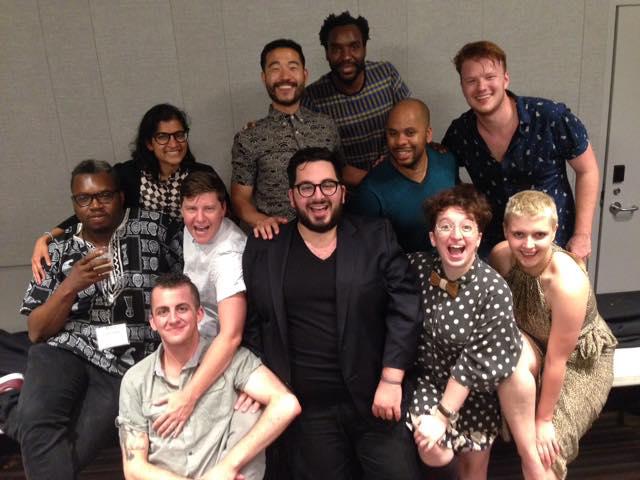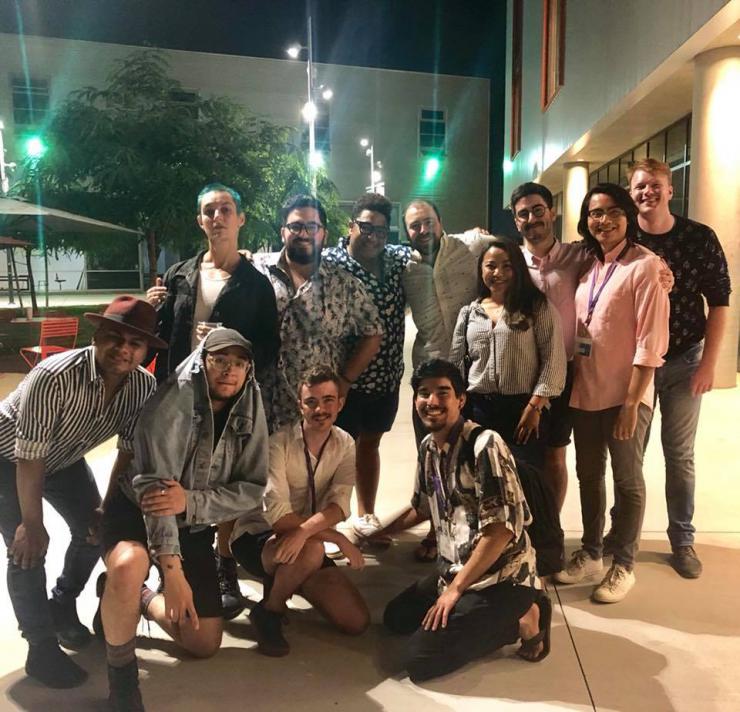Image via Shutterstock.
When the Lambda Emerging LGBTQ Voices Retreat was born in 2007, it was the first program of its kind for queer writers in the United States. Since then, annual week-long workshops have been led by queer faculty from a range of genres, organized by queer administration, for groups of around twelve queer writers of tomorrow.
But the retreat is more than just a week of queer writing. It’s a community, network, and opportunity to be taught by cohorts and instructors who share a common mythology.
At the playwrights’ table, lunch conversations dexterously flip from workshop pieces to coming-out stories to idiosyncratic partners. We talk about the intersectional politics of favorite Drag Race stars, and who among us are ‘language queens, spectacle queens, or movement queens’. Over the course of the week, we work in a room that understands how our writing and queerness are interconnected. ‘Ah, I totally see that in this scene,’ your cohort says. Emotional shorthand, maybe. A spoken or unspoken language that understands why you write about queer sex, or why you use those pronouns there.
My first time joining the 2017 Playwriting cohort (led by the incredible Phillip Howze), I knew I found a room without boundaries. As a young playwright, the retreat was so explosive because I realized that there wasn’t anyone in the room who I needed to justify my queerness to. Because of Phillip’s workshop encouragement to ‘abandon decorum—theatre doesn’t need any more decorum,’ I was able to write about sex and love and relationships in ways I’d never felt allowed to before.

2017 Lambda Playwriting Cohort (led by Phillip Howze). Photo courtesy of Abraham Johnson.
But after my first time at Lambda, I struggled returning to my writing community in Athens, Georgia. The wonder and potential of writing to the furthest queer boundary evaporated. On one occasion I sat in a writing workshop and held eye contact with the only other queer person in the room as one of my pieces was repeatedly called ‘confusing’. I played with pronouns. I wrote heavy allusions to AIDS history. When my queer peer clarified this history to the class, a straight student responded that the piece needed an appendix: ‘Maybe you should make it easier for straight people to get.’ That was the turning point that made me apply to the Lambda Retreat again. I had to be back in that room, and I was incredibly fortunate to return in the 2018 Playwriting cohort, led by the wonderful Luis Alfaro and held at Otis College of Art and Design in Los Angeles. Over the week of 5-12 August, I got to dig my roots back into the wonderful queer soil that let me grow so much a year before.
For an art form as communal as playwriting, opportunities like these are desperately necessary to bring LGBTQ artists together. No queer person has the exact same experience, but there is a common mythology to draw from in queer development rooms. Roger Q. Mason, a 2018 Lambda Fellow, described his sense of queer truth: ‘It’s the blues. We’re laughing to keep from crying, or we’re laughing because we don’t cry no more. There’s something about writing these emotional realities that are so much about queer survival in the world.’ So if there is a shared queer aesthetic (or multiplicity of that aesthetic), it would make sense to say that there might be queer developmental styles too.
Freddy Edelhart, a 2017 Lambda Fellow, says:
I can definitely tell when a piece was made with a queer lens… I love seeing the ways queer people (and oppressed/under-represented folks in general) are able to break open and away from these traditional artistic structures to make new ones that are built to serve us… if I can take something extant or canon and transform it into something new that I can then give back to queer people, I’m doing my job.
While Lambda isn’t the only queer developmental space for playwrights, these spaces are still rare. The Queer/Art Mentorship helps build intergenerational relationships between LGBTQ artists and mentors in a similar way, as does the NEEDING IT Program at the Brooklyn Arts Exchange. But both of those programs are exclusive to NYC-based artists. Other research, especially looking on a more national level, comes up pretty bare. So queer playwrights need more. More spaces. More funding. More everything.

2018 Lambda Playwriting Cohort (led by Luis Alfaro). Photo courtesy of Abraham Johnson.
And yes, theatre is also a business and we can’t just ignore straight audiences when we’re trying to fill seats. But the development room—the workshop— should allow a space for queer writers (and any writer outside what Phillip Howze calls the ‘supremacy theatre canon’ of straight/cis/whiteness) to experiment and fail in new ways. If we only focus on developing art that is readily consumable, we risk contributing to a homogenous theatre. And I mean that nationally. One of the most vital gifts Luis Alfaro offered in his Lambda workshop was understanding that queer theatre can happen anywhere if we build those communities. So not just in New York. Not just Chicago. We can make queer theatre in Athens, Georgia. We can make it in our homes and garages and gardens. We can support queer artists and build a community of queer theatremakers anywhere and everywhere.
I can understand some straight readers finding this conversation a little off-putting: how can you help build queer development opportunities while not taking up that space? But, really, there are plenty of ways you can support your local queer playwrights:
- Provide space for queer writers to assemble. Living rooms. Classrooms. Rehearsal rooms.
- If you can afford to, provide printing. New playwrights quickly learn how expensive printing can be, and for many queer identities expendable income is not a reality (the price of straight/cis health insurance alone is a privilege to consider). So, monetize your help and offer your ink.
- Don’t pit queer artists against each other with singular grants. Theatre is competitive enough, so if you can unify queer artists (say, by producing a Queer theatre festival) you’re going to do more good than benefitting one lucky playwright.
- If these gatherings of queer people are all white, interrupt them. They are not helping.
- If these gatherings of queer people are all cisgender men, interrupt them. They are not helping.
- Let us write about sex and queer love. Think hard before you ask us to justify it. Then don’t ask.
If theatre is an art form that celebrates the body and breath in front of an audience, it needs all the queer lungs we can put onstage. Maybe with more opportunities, queer playwrights will find their fresh air.
Or maybe we’ll breathe fire.
This piece, ‘How to Care for Your Queer Playwright: Development, Community, and Fresh Air’ by Abraham Johnson, was originally published on HowlRound on 6 September 2018.





